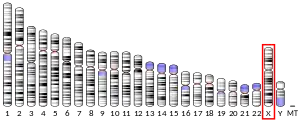| RPL36A | |||||||||||||||||||||||||||||||||||||||||||||||||||
|---|---|---|---|---|---|---|---|---|---|---|---|---|---|---|---|---|---|---|---|---|---|---|---|---|---|---|---|---|---|---|---|---|---|---|---|---|---|---|---|---|---|---|---|---|---|---|---|---|---|---|---|
| |||||||||||||||||||||||||||||||||||||||||||||||||||
| Identifiers | |||||||||||||||||||||||||||||||||||||||||||||||||||
| Aliases | RPL36A, L36A, L44L, MIG6, RPL44, ribosomal protein L36a | ||||||||||||||||||||||||||||||||||||||||||||||||||
| External IDs | OMIM: 300902 HomoloGene: 776 GeneCards: RPL36A | ||||||||||||||||||||||||||||||||||||||||||||||||||
| |||||||||||||||||||||||||||||||||||||||||||||||||||
| |||||||||||||||||||||||||||||||||||||||||||||||||||
| |||||||||||||||||||||||||||||||||||||||||||||||||||
| |||||||||||||||||||||||||||||||||||||||||||||||||||
| Wikidata | |||||||||||||||||||||||||||||||||||||||||||||||||||
| |||||||||||||||||||||||||||||||||||||||||||||||||||
60S ribosomal protein L36a is a protein that in humans is encoded by the RPL36A gene.[3][4]
Cytoplasmic ribosomes, organelles that catalyze protein synthesis, consist of a small 40S subunit and a large 60S subunit. Together these subunits are composed of 4 RNA species and approximately 80 structurally distinct proteins. This gene encodes a ribosomal protein that is a component of the 60S subunit. The protein, which shares sequence similarity with yeast ribosomal protein L44, belongs to the L44E (L36AE) family of ribosomal proteins. Although this gene has been referred to as ribosomal protein L44 (RPL44), its official name is ribosomal protein L36a (RPL36A). This gene and the human gene officially named ribosomal protein L36a-like (RPL36AL) encode nearly identical proteins; however, they are distinct genes. As is typical for genes encoding ribosomal proteins, there are multiple processed pseudogenes of this gene dispersed through the genome.[4]
References
- 1 2 3 GRCh38: Ensembl release 89: ENSG00000241343 - Ensembl, May 2017
- ↑ "Human PubMed Reference:". National Center for Biotechnology Information, U.S. National Library of Medicine.
- ↑ Dixit VM, Hennessy SW, Grant GA, Rotwein P, Frazier WA (Sep 1986). "Characterization of a cDNA encoding the heparin and collagen binding domains of human thrombospondin". Proc Natl Acad Sci U S A. 83 (15): 5449–53. Bibcode:1986PNAS...83.5449D. doi:10.1073/pnas.83.15.5449. PMC 386304. PMID 3461443.
- 1 2 "Entrez Gene: RPL36A ribosomal protein L36a".
Further reading
- Wool IG, Chan YL, Glück A (1996). "Structure and evolution of mammalian ribosomal proteins". Biochem. Cell Biol. 73 (11–12): 933–47. doi:10.1139/o95-101. PMID 8722009.
- Davies MS, Henney A, Ward WH, Craig RK (1987). "Characterisation of an mRNA encoding a human ribosomal protein homologous to the yeast L44 ribosomal protein". Gene. 45 (2): 183–91. doi:10.1016/0378-1119(86)90253-2. PMID 3542712.
- Oeltjen JC, Liu X, Lu J, et al. (1995). "Sixty-nine kilobases of contiguous human genomic sequence containing the alpha-galactosidase A and Bruton's tyrosine kinase loci". Mamm. Genome. 6 (5): 334–8. doi:10.1007/BF00364796. PMID 7626884. S2CID 22686077.
- Kato S, Sekine S, Oh SW, et al. (1995). "Construction of a human full-length cDNA bank". Gene. 150 (2): 243–50. doi:10.1016/0378-1119(94)90433-2. PMID 7821789.
- Vorechovský I, Vetrie D, Holland J, et al. (1994). "Isolation of cosmid and cDNA clones in the region surrounding the BTK gene at Xq21.3-q22". Genomics. 21 (3): 517–24. doi:10.1006/geno.1994.1310. PMID 7959728.
- Cross SH, Charlton JA, Nan X, Bird AP (1994). "Purification of CpG islands using a methylated DNA binding column". Nat. Genet. 6 (3): 236–44. doi:10.1038/ng0394-236. PMID 8012384. S2CID 12847618.
- Oeltjen JC, Malley TM, Muzny DM, et al. (1997). "Large-scale comparative sequence analysis of the human and murine Bruton's tyrosine kinase loci reveals conserved regulatory domains". Genome Res. 7 (4): 315–29. doi:10.1101/gr.7.4.315. PMID 9110171.
- Gubin AN, Njoroge JM, Bouffard GG, Miller JL (1999). "Gene expression in proliferating human erythroid cells". Genomics. 59 (2): 168–77. doi:10.1006/geno.1999.5855. PMID 10409428.
- Uechi T, Tanaka T, Kenmochi N (2001). "A complete map of the human ribosomal protein genes: assignment of 80 genes to the cytogenetic map and implications for human disorders". Genomics. 72 (3): 223–30. doi:10.1006/geno.2000.6470. PMID 11401437.
- Strausberg RL, Feingold EA, Grouse LH, et al. (2003). "Generation and initial analysis of more than 15,000 full-length human and mouse cDNA sequences". Proc. Natl. Acad. Sci. U.S.A. 99 (26): 16899–903. Bibcode:2002PNAS...9916899M. doi:10.1073/pnas.242603899. PMC 139241. PMID 12477932.
- Ota T, Suzuki Y, Nishikawa T, et al. (2004). "Complete sequencing and characterization of 21,243 full-length human cDNAs". Nat. Genet. 36 (1): 40–5. doi:10.1038/ng1285. PMID 14702039.
- Kim JH, You KR, Kim IH, et al. (2004). "Over-expression of the ribosomal protein L36a gene is associated with cellular proliferation in hepatocellular carcinoma". Hepatology. 39 (1): 129–38. doi:10.1002/hep.20017. PMID 14752831. S2CID 36029858.
- Gerhard DS, Wagner L, Feingold EA, et al. (2004). "The Status, Quality, and Expansion of the NIH Full-Length cDNA Project: The Mammalian Gene Collection (MGC)". Genome Res. 14 (10B): 2121–7. doi:10.1101/gr.2596504. PMC 528928. PMID 15489334.
- Ross MT, Grafham DV, Coffey AJ, et al. (2005). "The DNA sequence of the human X chromosome". Nature. 434 (7031): 325–37. Bibcode:2005Natur.434..325R. doi:10.1038/nature03440. PMC 2665286. PMID 15772651.
- Ewing RM, Chu P, Elisma F, et al. (2007). "Large-scale mapping of human protein–protein interactions by mass spectrometry". Mol. Syst. Biol. 3 (1): 89. doi:10.1038/msb4100134. PMC 1847948. PMID 17353931.

